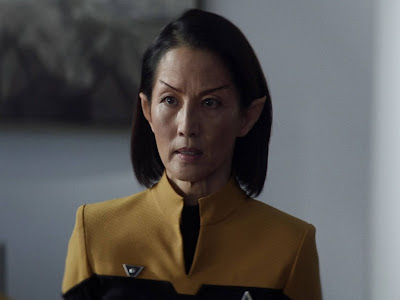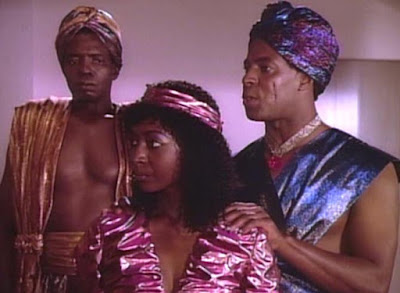For those who are new to my episode reviews, you can find the post where I establish my point criteria here.
Score: 9/10 – Imagine Seven of Nine as an unexpected
adoptive mother, and that is the basic theme of this episode. It is a touching
and heart-felt tale of an unusual character that sadly only appears once in
this episode. When re-watching it to write this review, I was impressed with a
lot of the attention to even small details that was given to this excellent
character story. Of course, as was the case in many of these season 4-5
episodes, it focuses mostly on Seven of Nine, although the Doctor is
prominently featured. I particularly liked how the episode began and ended with
the same shot of Seven examining herself in a mirror. At the start, she is
practicing her smile, while at the end it looks as if she is trying to pick up
where she left off but finds that she cannot after the loss of One. One himself
is an interesting character, one that develops quickly. I would say that the
only thing that I would have done differently would have been to spread this
out over more than one episode. The movement from his adjusting to life on
Voyager to the point where he sacrifices himself for the crew seems a bit
rushed at the end. One is such a cool character that his untimely demise could
have been even more powerful if he had been around for at least another
episode. Despite that, this is a very enjoyable episode and should warrant a
few viewings in one’s lifetime.
Relevance - 2 points. At the start of the shuttle
mission the away team experiences some turbulence. This leads to some criticism
of the type II shuttle they are using, to which Seven suggests that Paris
designs and builds a bigger and more efficient type of shuttle. In the next
episode, “Extreme Risk”, Tom has indeed designed a new shuttle, which became
the Delta Flyer. I am also scoring a point for Seven's motherly instincts that will be very evident later in this series with Icheb, and carries over into Star Trek: Picard.
Continuity – 3 points. One of the nice features of this episode can be addressed in discussing its story continuity. When you watch this episode, pay attention to the number of security guards that are assigned to escort One. At the beginning there are at least three, all heavily armed. As One’s character grows and becomes more accepted, the number of guards and their armaments decreases. It’s those types of little details that strengthen the story. Character continuity is also solid here. The Doctor is naturally distraught over losing his mobile emitter, Neelix is used perfectly as one of One’s early guides/friends. B’Elanna shows typical annoyance at having another Borg on the ship. Seven is acts as we would expect a former drone to act in an unexpected parental role (which adds a fair bit of humor to the story). Janeway’s use is particularly noteworthy here. She mentions that she would rather try to help the drone become an individual as a means of protecting themselves from the Borg. She mentions that she would rather not have to kill the drone, although she makes it clear that she will do it if necessary. This reminded me of her choice to sacrifice Tuvix to restore Tuvok and Neelix. Her statements here fit her character perfectly. As for universe continuity, that also gets its point.
Character Development – 3 points. Of course, there is a lot of
development for Seven in this episode. She goes through many stages of
parenting in a short amount of time, from infant to child to adolescent. We
also see in the opening shot that she is trying to improve her interpersonal
skills by practicing a smile. I also found that the Doctor was given some
important development here. For almost two years he had enjoyed the freedom
that a mobile emitter gave him. It was nice to see him faced with the
possibility of losing that freedom. When One mentions that the emitter is a
part of his central nervous system, the Doctor’s expressions accurately depicts
the sting he still feels at his re-imposed limitations. That is partially due
to Robert Picardo’s excellent acting in this episode.
Social Commentary – 3 points. Dealing with becoming a parent
and the loss of someone you care for are just two themes rolled into one in
this story. Seeing the drone follow Seven like a little child, trying to be
like his “mother”, is cute and relatable. Seeing how Seven has to learn
patience with the emotionally juvenile Borg causes many parents to nod in
appreciation for what she is going through. As I mentioned earlier, Seven had
been practicing her smile. At the end of the episode, she turns back to her
mirror in an apparent attempt to return to her earlier endeavors. After
suffering the loss of One, she just cannot find it in herself to go back to her
old routine just yet. That is something that almost all of us who have lost
someone important to us can relate to.
Cool Stuff –2 points. A point must be scored for One.
Everything from his look to the wonderful performance by J. Paul Boehmer gives
us a delightful character that we are sad to see go and makes us wish that he
could have been around longer. In today’s television I suspect he would have
been around for at least one, maybe two more episodes before being killed off,
just to hit us even harder in our emotional core. I am also scoring a point
here for the proto-nebula. They are able to get some beautiful shots of Voyager
super-imposed on the nebula. It is a really good effect that adds to the
already strong episode.
Rank – Admiral (21 points). An excellent episode that seems to truly
capture Seven of Nine in an engaging way. The fine attention to detail be
director Les Landau adds to the strength of a compelling story that draws you
in and gives us a memorable, yet sadly one-time only, character. One of the
highlights of Voyager’s fifth season.
























































